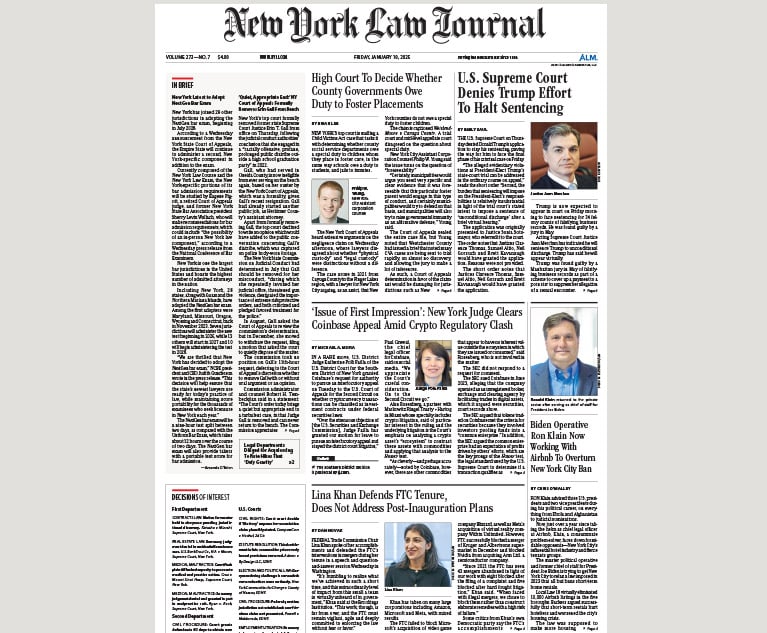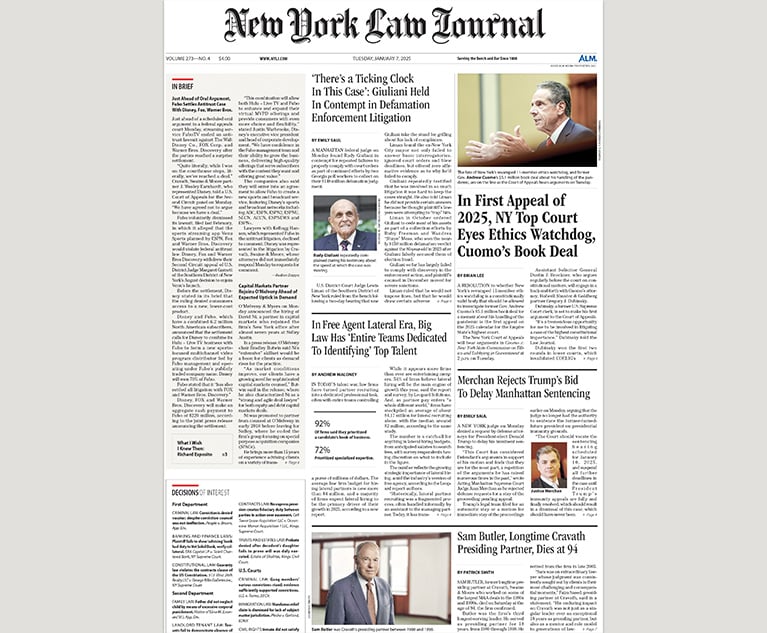Weitz & Luxenberg Can’t Cut Victim's Son From $1.2 Million Legal Malpractice Suit
An Albany judge noted that the request to cut a mesothelioma victim's son from co-administering his estate came just months before trial on the estate's malpractice claims.
August 15, 2019 at 04:44 PM
3 minute read
 Albany County Courthouse. Photo: Joseph/Flickr
Albany County Courthouse. Photo: Joseph/Flickr
In a $1.2 million legal malpractice case against Weitz & Luxenberg, an Albany judge has rejected a bid by the plaintiff’s firm to remove the son of a deceased mesothelioma victim from the case.
Surrogate Stacy Pettit said Monday that the son of mesothelioma victim Gustave Benson could continue as co-administrator of Gustave’s estate for the purpose of bringing the suit, which Weitz had fought against. The ruling is a set back for the law firm two months before the malpractice trial begins.
In the underlying wrongful death case, Weitz helped three children of Benson win settlements totaling almost $1.2 million, after legal fees. But three other half-siblings didn’t share in the money, leading a judge to find Gustave’s daughter Catherine Shufelt, the estate administrator, liable for breaching her fiduciary duty to the estate. She was ordered to pay $598,000.
Shufelt claimed she told a law firm investigator about Robert and his brothers, but after she clarified they were half-siblings, the investigator said, “then we don’t count them,” according to a 2017 decision in the case. She teamed up with half-brother Robert Benson and sued Weitz for malpractice, claiming the law firm was responsible for the error.
With Shufelt’s consent, Benson was named a co-administrator of Gustave’s estate in March 2018 for the purpose of bringing a malpractice suit, according to Pettit’s ruling.
But with two months to go until trial, Weitz sought to have Benson booted from the case, arguing that he didn’t have a sufficient enough relationship—or “a relationship of privity”—with the law firm because it was Shufelt who had retained Weitz back when she was the sole estate administrator, the judge wrote.
In her Monday ruling, Pettit said it was too late for Weitz to object. Even if its objection had been timely, she continued, Robert Benson “has a relationship sufficiently approaching privity with respondent, counsel for the initial estate administrator, to maintain a claim against respondent for professional malpractice.”
“Here, respondent specifically addressed the issue of [Robert] Benson being added as a party in its answer and deferred to the court’s discretion,” she wrote. “If respondent objected to Benson being added as a party, that objection should have been raised in its answer filed in early 2018.”
The judge cited a 2010 ruling by New York’s top court in Estate of Schneider v. Finmann, in which the Court of Appeals established an estate-administration exception to the normal rule that a third party can’t sue an attorney for professional negligence without fraud, collusion, or other special circumstances.
In their malpractice case, Shufelt and Benson are seeking an order that would require Weitz & Luxenberg to pay nearly $1.2 million to their father’s estate for distribution to Robert Benson and his siblings, according to Pettit’s decision.
Frederick M. Altman, an attorney who represents Shufelt and who runs his own firm, and Michael Basile of Higgins, Roberts & Suprunowicz, who represents Benson, didn’t respond to comment requests.
Weitz & Luxenberg’s attorney in the malpractice case, Peter Moschetti of Anderson, Moschetti & Taffany, didn’t respond to a request for comment. Neither did a spokeswoman for the firm.
This content has been archived. It is available through our partners, LexisNexis® and Bloomberg Law.
To view this content, please continue to their sites.
Not a Lexis Subscriber?
Subscribe Now
Not a Bloomberg Law Subscriber?
Subscribe Now
NOT FOR REPRINT
© 2025 ALM Global, LLC, All Rights Reserved. Request academic re-use from www.copyright.com. All other uses, submit a request to [email protected]. For more information visit Asset & Logo Licensing.
You Might Like
View All
Sullivan & Cromwell Signals 5-Day RTO Expectation as Law Firms Remain Split on Optimal Attendance
Trending Stories
Who Got The Work
Michael G. Bongiorno, Andrew Scott Dulberg and Elizabeth E. Driscoll from Wilmer Cutler Pickering Hale and Dorr have stepped in to represent Symbotic Inc., an A.I.-enabled technology platform that focuses on increasing supply chain efficiency, and other defendants in a pending shareholder derivative lawsuit. The case, filed Oct. 2 in Massachusetts District Court by the Brown Law Firm on behalf of Stephen Austen, accuses certain officers and directors of misleading investors in regard to Symbotic's potential for margin growth by failing to disclose that the company was not equipped to timely deploy its systems or manage expenses through project delays. The case, assigned to U.S. District Judge Nathaniel M. Gorton, is 1:24-cv-12522, Austen v. Cohen et al.
Who Got The Work
Edmund Polubinski and Marie Killmond of Davis Polk & Wardwell have entered appearances for data platform software development company MongoDB and other defendants in a pending shareholder derivative lawsuit. The action, filed Oct. 7 in New York Southern District Court by the Brown Law Firm, accuses the company's directors and/or officers of falsely expressing confidence in the company’s restructuring of its sales incentive plan and downplaying the severity of decreases in its upfront commitments. The case is 1:24-cv-07594, Roy v. Ittycheria et al.
Who Got The Work
Amy O. Bruchs and Kurt F. Ellison of Michael Best & Friedrich have entered appearances for Epic Systems Corp. in a pending employment discrimination lawsuit. The suit was filed Sept. 7 in Wisconsin Western District Court by Levine Eisberner LLC and Siri & Glimstad on behalf of a project manager who claims that he was wrongfully terminated after applying for a religious exemption to the defendant's COVID-19 vaccine mandate. The case, assigned to U.S. Magistrate Judge Anita Marie Boor, is 3:24-cv-00630, Secker, Nathan v. Epic Systems Corporation.
Who Got The Work
David X. Sullivan, Thomas J. Finn and Gregory A. Hall from McCarter & English have entered appearances for Sunrun Installation Services in a pending civil rights lawsuit. The complaint was filed Sept. 4 in Connecticut District Court by attorney Robert M. Berke on behalf of former employee George Edward Steins, who was arrested and charged with employing an unregistered home improvement salesperson. The complaint alleges that had Sunrun informed the Connecticut Department of Consumer Protection that the plaintiff's employment had ended in 2017 and that he no longer held Sunrun's home improvement contractor license, he would not have been hit with charges, which were dismissed in May 2024. The case, assigned to U.S. District Judge Jeffrey A. Meyer, is 3:24-cv-01423, Steins v. Sunrun, Inc. et al.
Who Got The Work
Greenberg Traurig shareholder Joshua L. Raskin has entered an appearance for boohoo.com UK Ltd. in a pending patent infringement lawsuit. The suit, filed Sept. 3 in Texas Eastern District Court by Rozier Hardt McDonough on behalf of Alto Dynamics, asserts five patents related to an online shopping platform. The case, assigned to U.S. District Judge Rodney Gilstrap, is 2:24-cv-00719, Alto Dynamics, LLC v. boohoo.com UK Limited.
Featured Firms
Law Offices of Gary Martin Hays & Associates, P.C.
(470) 294-1674
Law Offices of Mark E. Salomone
(857) 444-6468
Smith & Hassler
(713) 739-1250









